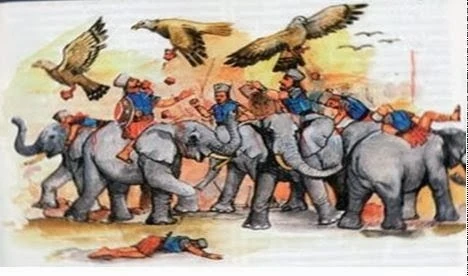By: Sigit Mukti Nugroho
Majority of people in the west see Islam as a religion with threat to unity. Islam is mostly viewed as a religion identical with terrorism due to most media reports. Majority of people in the world see Muslims as orthodox religious believers who are so strict, militant, extreme, often have no respect to the country they live. Islam is viewed to be spread by sword, sometimes they are also claimed to always condemn those who are different from them. The worst is of course by violent actions.
The very different fact about the way of preaching Islam can be found in Indonesia. People of Indonesia, especially in Java Island at old times, were firstly dominated by beliefs of animism and dynamism. Most of people believed in spiritual power beyond and within materials which can be seen.
Beginning from the 13th century, Islam came to Indonesia brought by Muslim traders and scholars from the middle east. What is unique and interesting about the way Islam was spread, which will be the focus of this article, happened in Kudus, Central Java. The spread of Islam in Kudus was initiated mainly by Kiai Telingsing and followed by Sunan Kudus, a Muslim scholar originally named Ja’far Shadiq in 16th century. Ja'far Shadiq was one of scholars amongst several Muslim scholars sent by the Ottoman caliphate.
Figure 1 Map of Central Java
Figure 2 Kudus People in Traditional Cultural Outfits
Initially, most of the people in Kudus were Hindus and Buddhists. To spread Islam in this sort of community was never an easy task to do. It demanded a smart, creative, grounded, and humanistic solution. Islam surely always has solutions for every problem in human life. Persuasive style of Da'wah (spreading Islamic teaching) was often carried out.
To do this, Sunan Kudus decided to import a cow from India and tied it which he named ‘Kebo Gumarang’ in front of his mosque (some other sources say it was in front of his house yard) to attract the people’s attention. This easily attracted the Hindus people who highly respected and worshiped cows. Both Hindu and Buddhist peoples soon gathered in front of the mosque to see their glorified mammal being tied by Sunan Kudus and anticipated what he would probably do with the cow. Remember that they believed the animal was the vehicle ridden by God Wisnu, one of the Gods in Hinduism.
Figure 3 Picture Depicting the Figure of Sunan Kudus
With early anxiety that Ja’far Shadiq would probably kill or slaughter the cow in front of their eyes, the people listened to Ja’far Sadiq explanation. He elaborated his intention, "Ladies and Gentlemen, my beloved fellows. I forbid you all to hurt or even slaughter cows. It is because when I was still kid, I was about to die due to severe dehydration. Fortunately, a cow came to me and breastfed me.”
Hearing Ja’far’s story, Hindu people were amazed, astonished. They thought Ja’far Sadiq was an incarnation of Visnu, one of Gods in Hinduism. Thus, they got really curious to listen to his sermon.
“For what has ever happened to me with a cow, I forbid all the people of Kudus to hurt or slaughter cows!”
While Ja’far Sadiq continued his message, "One of the surahs in Quran, the second one, is called Surah of Cows, or in Arabic, it is called Al Baqarah,” the people were getting more amazed and curious. They were interested to know more about Quran. They thought, 'how could a holy book of a religion talked about cow? how would it probably talk of it?'
The people felt that they really had to come to Sunan Kudus regularly to listen to his sermon.
In a soft and very delicate way, Sunan Kudus preached the messages of Islam. He also built a temple-like minaret right beside the mosque of Al Aqsha, Kudus. If we notice the architecture, it obviously seems that the temple is very identical to Hindu building. So, this building stands side by side with the mosque. With this kind of Hindu-typical-architectured minaret, people of Kudus at old times who firstly embraced Hindu felt comfortable to join Sunan Kudus’ sermons. As the time flew, more and more people converted to Islam with their own personal intentions. That is how Sunan Kudus preached. Through acculturation, without forcing or even condemning the people of the society, Islam is now a religion of the majority people, especially in Kudus.
After a big number of Hindu people converted to Islam just because of high degree of tolerance presented by Sunan Kudus’ attitudes as well as the attraction of the Hindu-architectured building, Sunan Kudus now turned the spread of Islam to the Buddhist people.
Figure 4: Hindu-temple like minaret of Kudus, decorated in Hindu architecture style, stands side by side with Al Aqsha Mosque
Sunan Kudus then built a place for ritual ablution with eight faucets, each of which had a symbolic relief of cow’s head. One again, this style was used to attract attention from the people. Now why would Sunan Kudus create eight faucets, not five or else? This number was decided to accommodate one of the Buddhist teachings called Sanghika Marga (eight-folded ways) which include:
1. righteous knowledge
2. righteous decision
3. righteous speech
4. righteous deeds
5. righteous way of working
6. righteous way of holding power
7. righteous way of attention
8. righteous way of appreciating religion.
This effort made its way to attract Buddhist people to come. They came to join Sunan Kudus’ sermons. And again, as the time went by, Islam became the religion of majority in Kudus. Many Muslim scholars were born, live, and teach there. We can say that the approach chosen by Sunan Kudus in preaching Islam is extremely tolerating. With this very high degree of tolerance, we see the positive impacts nowadays. Islamic teaching has been understood well and accepted fully by the majority of population.
More Interfaith Tolerance by Saladin
Figure 5 Pace for ritual ablution at Al Aqsha Mosque, Kudus, Indonesia
Another very clear impact on the society of Kudus which still employs today is the rareness (or even absence) of beef sellers. People of Kudus are more familiar with buffalo meats instead of beef due to Sunan Kudus’ past doctrine whose intention was to respect other religion, although Islam is now religion of the majority, and there is no prohibition of slaughtering breed animal like cows in Islam. So, in Idul Adha (Muslim fiest day beside Idul Fitri), instead of slaughtering cows as the common Muslim tradition of worshipping God, the majority of Kudus Muslim people will slaughter buffaloes. The preference on buffalo meats has made Kudus famous for its buffalo satay as well as its Soto Kerbau (Buffalo Soto). Soto itself is a typical Indonesian food made of broth and vegetables. The most popular meat for making broth is beef and chicken. In Kudus, however, it is chicken or buffalo to be the alternatives for making the broth for Soto.
Figure 6 Soto Kudus
If you ever come to Indonesia, visiting Kudus will be a very exciting journey ever. The culinary, the religious atmosphere, as well as the high tolerance always become temptation that will invite you to come and visit again and again.
 (from various sources)
(from various sources)
Written by:
Sigit Mukti Nugroho
Mlati Kidul RT 5 RW 1
Gang Nyai Dasimah No 6
Kudus, Central Java 59319
Indonesia
seagate.balaboners@gmail.com













